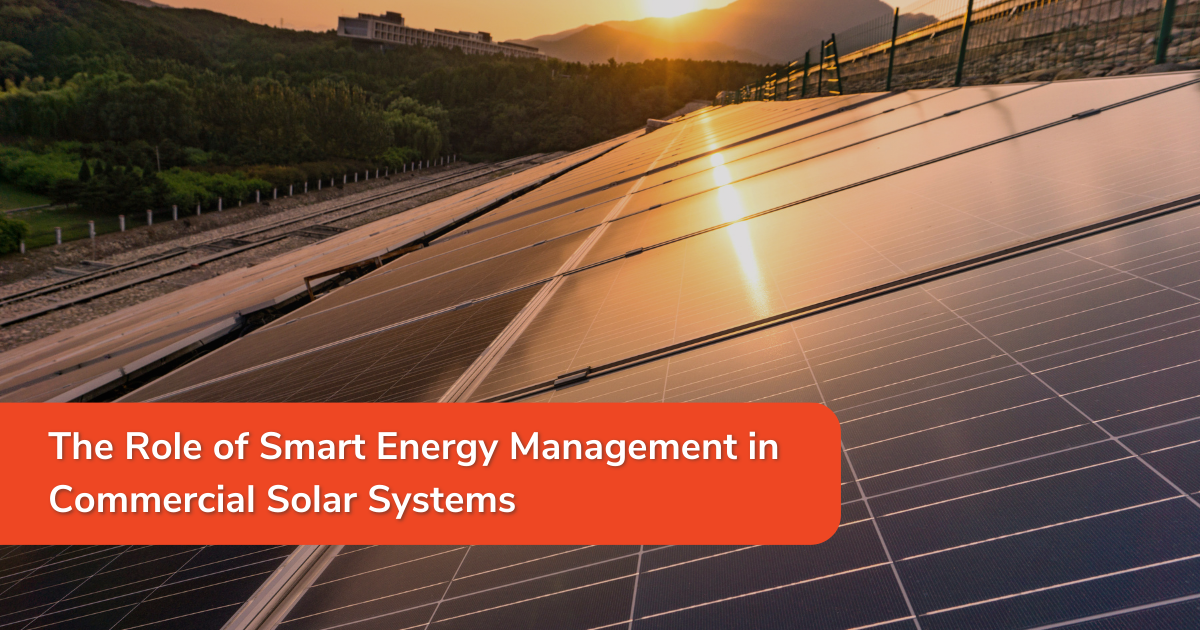The Role of Smart Energy Management in Commercial Solar Systems

As more businesses make the switch to solar power, the focus is shifting from not just generating clean energy, but managing it intelligently. Smart energy management is revolutionising the way commercial solar systems operate, enabling businesses to optimise energy usage, reduce costs, and increase overall efficiency. In this blog post, we explore the role of smart energy management in commercial solar setups and how it can transform your business's approach to energy.
What Is Smart Energy Management?
Smart energy management refers to the use of advanced software, sensors, and automation technologies to monitor, control, and optimise energy usage within a facility. When integrated with a commercial solar system, it provides real-time insights into energy production, consumption, and storage—allowing businesses to make data-driven decisions that maximise savings and performance..
Key Benefits for Businesses
Enhanced Energy Efficiency
Smart energy systems monitor energy flows in real time, helping businesses identify inefficiencies, peak usage times, and areas where energy consumption can be reduced. This enables precise control over energy usage, aligning it with solar generation and reducing dependency on grid power.Cost Reduction and Load Shifting
By analysing consumption patterns, smart energy systems can schedule high-energy activities during periods of peak solar generation or lower electricity rates. This form of load shifting helps minimise demand charges and lowers overall electricity costs.Improved Battery Storage Utilisation
When paired with commercial battery storage, smart energy management optimises when to store and when to discharge energy. It ensures that batteries are used strategically to maximise self-consumption and reduce grid reliance. Systems like the Tesla Powerwall, Sungrow SBR, and SolarEdge Battery integrate seamlessly with smart platforms to deliver optimal results.
Predictive Maintenance and Monitoring
Smart systems can identify equipment issues before they lead to failures, reducing downtime and maintenance costs. Advanced diagnostics and automated alerts ensure that solar installations perform at peak levels year-round.
Support for Sustainability and ESG Goals
Tracking and reporting energy metrics in real time helps businesses measure their environmental impact, which is essential for ESG reporting. Smart energy management provides the data needed to show progress toward carbon reduction and renewable energy adoption.
Integration with Virtual Power Plants (VPPs)
One of the most promising aspects of smart energy management is the ability to participate in Virtual Power Plant (VPP) programs. VPPs aggregate stored energy from multiple businesses and feed it into the grid, creating a decentralised energy network. Smart systems automate participation, allowing businesses to generate additional revenue while supporting grid stability.Choosing the Right System
When selecting a smart energy management solution, businesses should consider:
- Compatibility with existing solar and battery systems
- Real-time data analytics and remote monitoring
- Integration with VPPs and energy trading platforms
- Scalability to match future growth
- User-friendly interface and automated controls
Conclusion
Smart energy management is a game-changer for businesses looking to maximise the benefits of commercial solar systems. From improving efficiency and reducing costs to enabling participation in energy markets, these systems empower businesses to take full control of their energy strategy. If you're ready to upgrade your solar setup with intelligent energy management, Smart Energy Answers is here to guide you through the transition.
Contact us today to learn how we can design a smart solar solution tailored to your business goals.
%20(1).png?width=265&height=96&name=www.smartenergyanswers.com.auhs-fshubfsSmart%20Energy%20Answers%20Logo%20(HIRES)%20(1).png)

.png?width=514&height=121&name=Tesla%20Powerwall%203%20(new).png)







